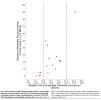This is from 2024, just catching up with an old post report:
Science Quickly (SciAm), 3/14/24: "Large Study of ME/CFS Patients Reveal Measurable Physical Changes"
(12 min episode w/Avindra Nath & Brian Vastag - not sure I caught when it came out in March - thanks @B_V)
Nath: “One, we found that there was activation of the immune system in the ME/CFS patients. It was almost like the immune system was exhausted from being chronically activated.”
“Avi really hopes that this will lead to treatments. Even though the study didn't find so-called autoantibodies, which are a sign that the body is attacking itself, like some studies have found, it did find signs of B and T cell wonkiness, if you will. And the treatments could depend on your sex...So in women, you could try things like checkpoint inhibitors, which are used as a type of immunotherapy for cancer. And for men, you might be able to try various T cell therapies.”
Brian: "I feel like they need to do treatment trials, like that needs to be the next step. Patients are desperate, and patients need treatment, and we can't just wait to figure out the entire pathophysiology, like we need to start.”
Hosts (Tanya Lewis & Josh Fischman, Scientific American's senior health editors): "Well, I'm glad to hear that they're starting, but what about long COVID? Could this research benefit people with that? Yeah, it might. There's certainly a lot more interest in these conditions now, given how many people have long COVID....That's really important, because ME/CFS, and Long COVID both take a real toll. They ruin lives.”


